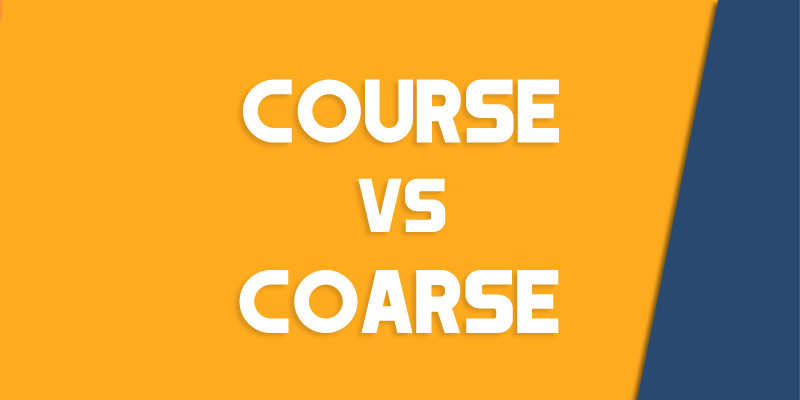Course versus Coarse – What’s the Gist?
Course and coarse are homophones, meaning that they sound alike when spoken. Only one vowel separates these two words in likeness in spelling.
- Course is a noun that refers to a field of study or a group of classes, such as one might take in high school or college.
- Coarse, however, is an adjective that means rough (to the touch) or crude.

How to Use Course in a Sentence
Course definition. Course is a noun that refers to one of the classes one might take when completing a field of study.
For example,
- Most college freshmen are obligated to take English Composition and College Algebra courses to complete any major field of study.
- Prospective teachers must take a number of educational courses in order to receive a degree in that concentration.
If you’re talking about the classes that someone takes in of school, then course is the word you are thinking of..
Course may also refer to a particular path one takes.
- The captain changed the course of the ship due to the impending hurricane.
How to Use Coarse in a Sentence
Coarse definition. Coarse is always used as an adjective and usually describes how something feels to the touch.
Likely, you’ve heard coarse describe a wide variety of objects, such as someone’s hair or a piece of fabric. This is the chief use of the word, but you may have also seen it describe the way someone talks. In particular, it may refer to offensive language.
- The dog’s coat was coarse to the touch. (rough to the touch)
- The sailor’s coarse language made the elderly lady blush. (rough, crude language)
Coarse can also be used to describe an object that is made out of big pieces. In this instance, coarse is the opposite of fine, as in “finely chopped onions.” Coarsely chopped vegetables are those cut into large pieces.
- The recipe called for the chicken breast to be coarsely chopped then added to the soup mixture.
Outside Examples of Course and Coarse
- So the Fed had to give in and reverse course earlier this year. Washington Post
- Little shelled out $9,000 to crooked college counselor to have one of his employees take four courses in her son’s place from 2017 through April 2018. Chicago Sun Times
- His manners are sometimes missing. He can be coarse and a bully. Chicago Tribune
- That incident occurred against Nashville in the playoffs. It was coarse, nasty and shocking. New York Times
Phrases that Use Course and Coarse
Of course: One of the most common places you’ll see course is in the phrase “of course.” This is typically an adverb, and it usually introduces an idea as something that was expected.
Change course: You might see the term course used to describe a path, direction, or progression. Often you’ll see this when someone says they had to “change course,” which means they had to change direction or change their overall objectives.
How to Remember These Words
Course and coarse are two homophones that are almost spelled identically, which proves difficult for some when choosing the right spelling.
One way to remember how to use course is to keep in mind that one typically studies courses and that both “study” and “course” are spelled with a “u.”
A synonym for coarse is the word harsh. Similarly, coarse is spelled with an “a” and harsh, the definition, is spelled with an “a.”
Article Summary
Is course or coarse correct? If you are discussing burlap or wool and the texture of said items, you’ll want to use the term coarse to describe how these objects feel. However, when discussing classes a student takes in order to obtain a diploma or a degree, you’ll want to use the word course.
- Course is a noun; it may describe classes one takes in school, but it can also describe a path by which one journeys.
- Coarse is an adjective. It can describe fabric or another object that feels rough when touched; coarse language is such that is offensive or crude.
